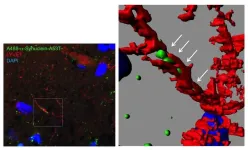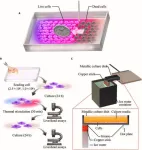(Press-News.org) New research highlights that genetic background can affect individual responses to GLP-1R agonist drugs.
Researchers reveal for the first time that high blood sugar levels in type 2 diabetes can play a causal role in lung disorders.
The study sheds light on the role of the digestive system, including the small intestine, ileum, and colon, in controlling blood sugar levels.
This is the largest-ever study into the genetic basis of random "round-the-clock" blood sugar levels.
Groundbreaking research published today in Nature Genetics describes the largest-ever study into the genetics of random "round-the-clock" blood glucose levels. The study, involving almost half a million people of diverse backgrounds, describes new DNA variants influencing blood sugar levels measured "at random". The team of researchers, led by Professor Inga Prokopenko at the University of Surrey on behalf of the Meta-Analysis of Glucose and Insulin-related Traits Consortium (MAGIC), analysed data from 17 major studies, including the UK Biobank.
This research highlighted that individual responses to drugs from the popular class of GLP-1R agonists, used to treat type 2 diabetes and obesity, can depend on DNA variants in the target gene, GLP1R.
Scientists also revealed, for the first time, that type 2 diabetes can directly cause lung complications. In the largest-ever genetic study exploring how genes affect blood sugar levels and health outcomes, researchers concluded that lung disorders should now be considered a complication of type 2 diabetes.
The study combining genetic and expression data shed light on the importance of the gastrointestinal tract, where the small intestine, ileum, and colon play important roles in the regulation of blood glucose levels, in addition to the well-established role of the pancreas.
Professor Inga Prokopenko, Professor of e-One Health and Head of Statistical Multi-Omics from the University of Surrey, said:
“This hugely important study, involving over a hundred scientists from around the globe, gives us new insights into the genetics of blood glucose levels and type 2 diabetes. Already now, we can act on better prevention from type 2 diabetes complications, including lung disease. We should improve treatment strategies for people with this condition, by studying individual DNA variants in relation to GLP-1R agonist response.”
Individual genetic background affects GLP-1R agonist susceptibility.
GLP-1R agonists are used to treat individuals with type 2 diabetes to improve their glycaemic control, meaning their ability to keep blood sugar levels within a normal range. Additionally, GLP-1R agonists have become very popular in helping individuals with type 2 diabetes lose weight, which can also improve their health and quality of life. The scientists conducted functional and structural characterisation of coding DNA variants in the GLP1R (GLP-1 receptor) gene. The authors highlight that the effect on GLP-1 receptor function and response to GLP-1R agonist drugs might differ from one individual to another depending on the GLP1R gene coding DNA variants they carry.
Overall, patients carrying specific DNA variants in the GLP1R gene are less likely to benefit from GLP-1R agonist drug treatment. The researchers suggest that doctors should pay more attention to individuals who get prescribed these specific drugs. By better matching the drug to the person's unique makeup, the treatment is more likely to work well for them.
Type 2 diabetes causes reduced lung function.
Previous studies have shown that lung conditions, including restrictive lung disease, fibrosis, and pneumonia, are more common in people with type 2 diabetes. However, until now, it was not known whether type 2 diabetes directly causes damage to the lungs or if other factors common to both conditions are responsible. Controlling for factors including smoking and sedentary behaviour, the team used a statistical technique called Mendelian randomisation to understand whether high blood sugar levels were linked to impaired lung function and whether one was causing the other. Lung function was measured using two common spirometry tests. The analysis revealed that high blood sugar levels in people with type 2 diabetes directly impaired lung function. For example, modelling of the study data showed that an increase in average blood sugar levels from 4 mmol/L to 12 mmol/L could result in a 20% drop in lung capacity and function.
With respiratory disease being the third biggest cause of death in England and hospital admissions for respiratory diseases in England and Wales having doubled over the last 20 years, the findings highlight the need for healthcare professionals to be vigilant about lung complications in people with type 2 diabetes. Diagnosing and treating lung disorders early could potentially save the lives of thousands of people with type 2 diabetes.
Role of Gastrointestinal Tract in Glucose Levels Regulation.
The study identified roles for tissues not previously implicated in glucose metabolism, most notably those belonging to the intestinal tract, specifically the ileum and colon. It is common knowledge that food eaten is received by the duodenum (the first part of the small intestine) and mixed there with digestive juices from the pancreas, liver, and gallbladder. The jejunum and ileum further break down food and absorb nutrients into the bloodstream.
The large intestine, also known as the colon, absorbs water and electrolytes from undigested food and hosts a diverse community of bacteria known as the gut microbiome. This study showed that the human gut microbiome and glycome are related to glucose levels regulation and highlighted the role of lactose- and galactose-based production of glucose by microbiome species Collinsella and Lachnospiraceae-FCS020.
Dr Vasiliki Lagou, postdoctoral scientist from the Section of Statistical Multiomics, the first author on the paper, added:
"Our research provides the first evidence that high blood sugar levels in type 2 diabetes can directly lead to lung damage. We hope our discovery that impaired lung function is a complication of type 2 diabetes is the first step towards increased awareness among healthcare professionals, leading to earlier diagnosis and treatment of lung conditions."
Dr Ayse Demirkan, Senior Lecturer in AI Multiomics for Health and Wellbeing from the University of Surrey, commented:
"Our study illuminates a less studied but hugely impactful role of the gastrointestinal tract in the regulation of blood sugar levels and type 2 diabetes. In addition to the pancreas, the small intestine and more specifically, the ileum, as well as the colon, contribute to glucose metabolism, as revealed by gene expression in these tissues. Additionally, we report relationships between glucose level regulation and gut microbiome species, specifically Collinsella and Lachnospiraceae-FCS020, which produce glucose from lactose and galactose."
Type 2 diabetes has many risk factors, including age, genetics, ethnicity, and body weight.
END
Genetic study of blood glucose levels calls for stratified treatment with GLP-1R agonists in type 2 diabetes, reveals the role of the intestine, and impact on lung function
2023-09-07
ELSE PRESS RELEASES FROM THIS DATE:
Bursting air bubbles may play a key role in how glacier ice melts, Oregon State research suggests
2023-09-07
CORVALLIS, Ore. – Oregon State University research has uncovered a possible clue as to why glaciers that terminate at the sea are retreating at unprecedented rates: the bursting of tiny, pressurized bubbles in underwater ice.
Published today in Nature Geoscience, the study shows that glacier ice, characterized by pockets of pressurized air, melts much more quickly than the bubble-free sea ice or manufactured ice typically used to research melt rates at the ocean-ice interface of tidewater glaciers.
Tidewater glaciers are rapidly retreating, the authors say, resulting in ice mass loss in Greenland, the Antarctic Peninsula and other glacierized regions around the globe.
“We ...
A secret passage for mutant protein to invade the brain
2023-09-07
Researchers from Tokyo Medical and Dental University (TMDU) show that the protein involved in Parkinson’s disease, α-synuclein, can propagate through the lymphatic system of the brain before it aggregates
Tokyo, Japan – In many neurodegenerative disorders, abnormal proteins progressively aggregate and propagate in the brain. But what comes first, aggregation or propagation? Researchers from Japan share some new insights about the mechanism involved in Parkinson’s disease.
In a study published ...
The need to hunt small prey compelled prehistoric humans to produce appropriate hunting weapons and improve their cognitive abilities
2023-09-07
A new study from the Department of Archaeology at Tel Aviv University found that the extinction of large prey, upon which human nutrition had been based, compelled prehistoric humans to develop improved weapons for hunting small prey, thereby driving evolutionary adaptations. The study reviews the evolution of hunting weapons from wooden-tipped and stone-tipped spears, all the way to the sophisticated bow and arrow of a later era, correlating it with changes in prey size and human culture and physiology.
The researchers explain: "This study was designed to examine a broader unifying hypothesis, which we proposed in a previous paper published in ...
Bioprinting methods for fabricating in vitro tubular blood vessel models
2023-09-07
A review paper by scientists at the Chonnam National University summarized the recent research on bioprinting methods for fabricating bioengineered blood vessel models. The new review paper, published on Aug. 1 in the journal Cyborg and Bionic Systems, provided an overview on the 3D bioprinting methods for fabricating bioengineered blood vessel models and described possible advancements from tubular to vascular models.
“3D bioprinting technology provides a more precise and effective means for investigating biological processes and developing new treatments than traditional 2D cell cultures. Therefore, it is a crucial tool ...
Titanium culture vessel presenting temperature gradation for the thermotolerance estimation of cells
2023-09-07
Hyperthermia is a potentially non-invasive cancer treatment that capitalizes on the heat intolerance of cancer cells, which are more sensitive than normal cells. In order to induce effective hyperthermia, it is necessary to apply the appropriate temperature according to the cell type, i.e., to comprehensively study the thermal toxicity of the cells, which requires accurate regulation of the culture temperature. Researchers from Keio University in Japan have developed a cell culture system with temperature ...
1 in 2 patients had better blood pressure control after using remote, bilingual program
2023-09-07
Research Highlights:
More than half of adults (55%) with uncontrolled blood pressure who enrolled in a digital monitoring program that connected patients with clinical advice and included a bilingual app paired with at-home blood pressure monitors had controlled final blood pressure measurements after participating for least 90 days.
Patients using the Spanish-language version of the digital monitoring program demonstrated more improvement in blood pressure control than patients who used the English-language version.
Embargoed until 6:30a.m. CT/7:30 a.m. ET Thursday, Sept. 7, 2023
BOSTON, Sept. 7, 2023 — Over half of patients ...
High blood pressure while lying down linked to higher risk of heart health complications
2023-09-07
Research Highlights:
An analysis of data from a long-running study of more than 11,000 adults from four diverse communities in the United States has found that adults who had high blood pressure while both seated upright and lying supine (flat on their backs) had a higher risk of heart disease, stroke, heart failure or premature death compared to adults without high blood pressure while upright and supine.
Adults who had high blood pressure while lying supine but not while seated upright had similar elevated risks of heart attack, stroke, ...
Cold weather may pose challenges to treating high blood pressure
2023-09-07
Research Highlights:
An analysis of electronic health records for more than 60,000 adults in the United States found that systolic, or top-number, blood pressure rose slightly during the winter compared to summer months. The health records were of adults being treated for high blood pressure from 2018 to 2023 at six health care centers of varying sizes located in the southeast and midwestern United States.
The researchers found that, on average, participants’ systolic blood pressure increased by up to 1.7 mm Hg in the winter months compared to the summer months.
They also found that population ...
Community-based, self-measured blood pressure control programs helped at-risk patients
2023-09-07
Research Highlights:
Community health centers participating in the National Hypertension Control Initiative (NHCI) that introduced self-measured blood pressure interventions to their patients — including individuals from Black, Hispanic and American Indian/Alaskan Native populations, who are disproportionately impacted by hypertension and by the COVID-19 pandemic — experienced improvements in blood pressure control rates since 2021, when NHCI began.
Community Health Centers in the NHCI that received funding from the U.S. Department of Health and Human Service’s Health Resources and Services Administration and Office of Minority Health and ...
Amsterdam UMC study finds elite athletes safely return to top-level sports after COVID-19: no issues found in more than 2 years of follow-up
2023-09-07
Heart problems after a COVID infection are a serious concern for both elite athletes and recreational athletes alike. A study from Amsterdam UMC, published today in Heart, offers some reassuring news. "We examined over 250 elite athletes and found that those who had contracted COVID-19 did not experience severe heart issues that impacted their careers," says Juliette van Hattum, a PhD candidate in sports cardiology at Amsterdam UMC.
The study specifically focused on elite athletes, a group that could be particularly susceptible to heart issues, particularly heart ...




